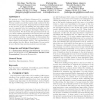Free Online Productivity Tools
i2Speak
i2Symbol
i2OCR
iTex2Img
iWeb2Print
iWeb2Shot
i2Type
iPdf2Split
iPdf2Merge
i2Bopomofo
i2Arabic
i2Style
i2Image
i2PDF
iLatex2Rtf
Sci2ools
100
click to vote
CIKM
2009
Springer
2009
Springer
A general markov framework for page importance computation
We propose a General Markov Framework for computing page importance. Under the framework, a Markov Skeleton Process is used to model the random walk conducted by the web surfer on a given graph. Page importance is then defined as the product of page reachability and page utility, which can be computed from the transition probability and the mean staying time of the pages in the Markov Skeleton Process respectively. We show that this general framework can cover many existing algorithms as its special cases, and that the framework can help us define new algorithms to handle more complex problems. In particular, we demonstrate the use of the framework with the exploitation of a new process named Mirror Semi-Markov Process. The experimental results validate that the Mirror Semi-Markov Process model is more effective than previous models in several tasks. Categories and Subject Descriptors H.3.3 [Information Storage and Retrieval]: Information Search and Retrieval; H.5.4 [Information In...
CIKM 2009 | Database | General Markov Framework | Markov Skeleton Process | Mirror Semi-markov Process |
Related Content
| Added | 26 May 2010 |
| Updated | 26 May 2010 |
| Type | Conference |
| Year | 2009 |
| Where | CIKM |
| Authors | Bin Gao, Tie-Yan Liu, Zhiming Ma, Taifeng Wang, Hang Li |
Comments (0)

